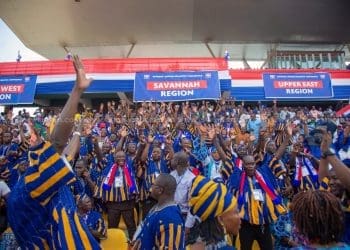The Legal Green Association (LGA), a coalition of professional law students with a focus on environmental justice, has outlined a set of bold initiatives to promote sustainable mining in Ghana as the government prepares to meet civil society organisations this Friday, October 3, 2025, over the galamsey crisis.
In a statement signed by its leader, Festus Matey, the association proposed five key initiatives—ranging from green mining technologies to stricter enforcement of polluter-pay principles—as part of what it calls a “towards sustainable mining” campaign.
A sustainable path to mining
According to LGA, the government must prioritise green mining technologies to reduce the destructive environmental impact of traditional mining practices.
Citing models from developed nations, the group urged Ghana to adopt cleaner, energy-efficient methods that minimise ecological disruption.
“The ultimate objective,” the statement said, “is to establish a sustainable mining model that decreases energy consumption and ecological damage.”
The association also called for the construction of water purification and treatment dams along rivers and streams most affected by illegal mining.
Such interventions, it argued, would restore polluted water sources, support the Ghana Water Company Limited, and help address long-term environmental harm.
Polluter pays principle
The statement strongly advocated for a Polluter and Producer Pay Principle, where all companies, individuals, or institutions benefiting from mining would be held financially responsible for environmental restoration.
LGA proposed the introduction of a mandatory environmental levy on extractive operations, with proceeds to fund a Small-Scale Mining Fund (SSMF).
The fund, it suggested, should support land reclamation and reforestation, water purification projects, tax waivers for eco-friendly operations, and incentives for sustainable practices. Traditional leaders and local communities, LGA emphasised, should play direct roles in monitoring and benefit-sharing to guarantee transparency.
Training and certification
To build capacity for a new generation of responsible miners, LGA urged the establishment of Regional Sustainable Mining Training Centres.
These centres would educate communities on environmentally friendly techniques, while Community Mining Agreements (CMAs) would be made mandatory for license approvals.
The group further proposed the introduction of a Green Mining Certificate as a compulsory requirement for certification, ensuring that mining operations meet rigorous environmental standards before being authorised.
Monitoring and enforcement
While backing existing government interventions against illegal mining, LGA stressed the importance of robust monitoring.
It called for annual environmental audits, GPS mapping, and drone surveillance to track mining activities.
Enforcing backfilling, re-vegetation, and responsible land-use zoning, the association argued, would help make mining both accountable and sustainable.
Constitutional backing
Referencing Article 257(6) and Article 36(9) of the 1992 Constitution, the association reminded the government that minerals are held in trust for the people of Ghana and that the state has a duty to safeguard the national environment for future generations.
At the same time, LGA acknowledged the economic reality that communities in mineral-rich areas often turn to mining, legally or otherwise, to survive—just as other communities benefit from fishing, farming, and salt mining.
For this reason, the association believes outright bans on small-scale mining would only deprive such communities of livelihoods. Instead, the focus must be on regulation and sustainable practices.
Call for collaboration
“The future of Ghana’s mineral wealth lies in the ability to balance economic needs with ecological stewardship,” the statement concluded.
“Sustainable mining practices are essential for the long-term success of Ghana’s mineral industry. Government, civil society, academia, and traditional authorities must collaborate to make this transformation real and irreversible.”
LGA said it was ready to collaborate with government and other stakeholders in both policy and technical engagements to ensure that sustainable mining becomes the backbone of Ghana’s fight against galamsey.












